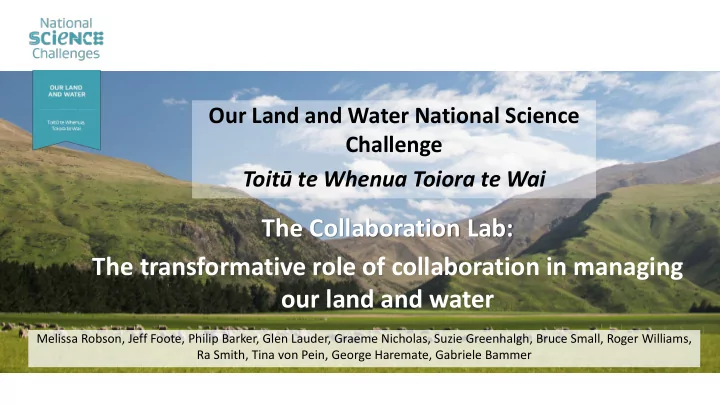

Our Land and Water National Science Challenge Toitū te Whenua Toiora te Wai The Collaboration Lab: The transformative role of collaboration in managing our land and water Melissa Robson, Jeff Foote, Philip Barker, Glen Lauder, Graeme Nicholas, Suzie Greenhalgh, Bruce Small, Roger Williams, Ra Smith, Tina von Pein, George Haremate, Gabriele Bammer
Why is the work needed from practice and research? “We need to collect on– going There is a lack of long evaluation otherwise things that were “We have already term evidence on the a big deal at the time become part of contribution of started… to change the wallpaper” collaborative the role of science and approaches 1 scientists… but there There is a paucity of “There is so much knowledge in studies of the is more needed in people’s heads at the leading practice of terms of integration… edges of collaborative practice” researchers other knowledge supporting complex sources, and problem solving 2 “ Whakawhanaugatanga - translation … and… Collaboration brings us into we are not relationship with each other” documenting how we Translating concepts of collaboration into are doing this “Collaborative processes practice is difficult and under-researched and interdisciplinary work, seem difficult and implementation challenges considered as only the results of it” barriers rather than areas of research 3 expensive, do they deliver better outcomes?” 1 Godin, 2006; Kläy et al., 2015; Newig, 2007 2 Bammer, 2013 3 Beretan, 2014
The research and capacity-building aims Hypothesis 1:Collaboration yields successful outcomes for land and water management in New Zealand Hypothesis 2: Integrative applied research is better able to address issues of concern to communities in the management of land and water in New Zealand, than single disciplinary and multi-disciplinary research (that is not integrative or applied). i) to understand how collaborative practice can lead to transformation ii) to build evidence on whether collaborative policy processes are successful in delivering multiple outcomes iii) to enhance understanding of critical factors that affect the impact of research in land and water iv) to build collaborative practice and capacity in New Zealand for both collaboration practitioners and researchers
The research team and participants and case study locations “To get change we have to connect science with people on the ground” “There is a need to redefine who the researchers are in the area of collaborative practice” “ Raranga is a key concept for the Lab, both Research team members Locations where we are working now the form and content: weaving people and knowledge to create new knowledge and Potential participants or case studies capacity”
The research and its impact and the value chain lens Value chain lens
Research project 1 – The practitioner Lab A VALUE CHAIN/WEB LENS Enabling value chain transformation Practice prototypes PEER 2 PEER / AKO AKO A “COMPOUND” LENS explore next practice Developing practitioners The power of seeing together and praxis WIDENING IMPACT Collaborative patterns Living examples of how of collective practice collective practice can be developed and scaled. Participant/ Practitioner experiences/stance NEXT PRACTICE A CITIZEN LENS Emergent capacities Seeing is understanding CONTEXT A DEVELOPMENTAL LENS SYSTEM IMPACT PEOPLE/PLACE/ as the fulcrum of transformation Global/Local PRACTICAL CHALLENGE and capacity development
A conceptual model built by a diversity of practitioners and a rich heritage of Māori collaboration means that the Māori perspective in building this conceptual model is critical.
Research project 2 – Evaluation of collaborative processes Builds on foundation Project goal: To build understanding from the VMO of how collaboration is (or is not) research programme enhancing natural resource management decisions. Research focus: The evaluations being undertaken focus on two key aspects Participants: Participants of regional of collaboration for policy council collaborative planning processes development – the dynamics within (Northland, Hawke’s Bay, Tasman) and collaborative groups (people and communities in catchments with and process) and the wider community without collaborative planning processes understanding and perceptions of (Northland, Hawke’s Bay, Waikato). collaboration.
Research project 3 – Improving research practice Tackling complex real-world problems Lots of relevant requires: experience, but • interdisciplinary collaboration among poorly documented. multiple disciplines, stakeholders and No agreed protocols. end-users • ability to manage multiple values, As a consequence interests, worldviews, personalities, don’t realise full approaches to uncertainty benefits of research • systems thinking (interrelationships) • appreciation of context Improved practice more integrated and • understanding of adverse unintended implementable research and a consequences and nasty surprises framework for capacity building • ...
Research project 3 – Improving research practice Project goal: To test if using the Integration and Implementation Sciences (I2S) Integration and Implementation Sciences framework (Bammer, 2013) (I2S) framework could lead to improved outcomes in land and water management in NZ through improved research practice. Participants: For each case study, data collection will be through workshops or interviews with research team and end users e.g. iwi, community, policy-makers, to gather project data, insights and reflections.
In a nutshell: what we’re doing and what will it contribute to? The Collaboration Lab will: • Show whether collaborative policy processes lead to improved outcomes • Show how collaboration can lead to transformation • Weave people and knowledge to create new knowledge and capacity This will help build: • A 20% increase in community confidence and ownership decisions in land and water decisions in 2025 compared to 2016
Thank you
Recommend
More recommend